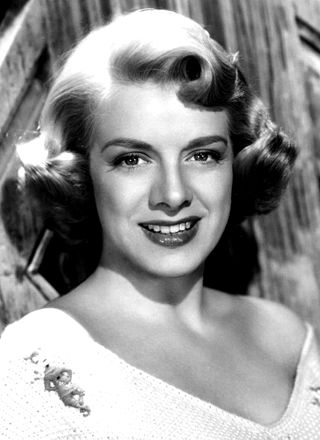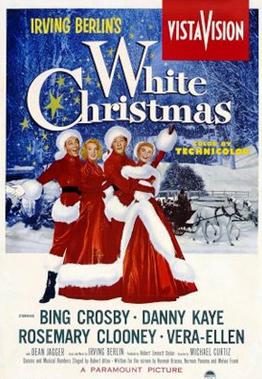Related Research Articles

Rose M. Clooney was an American singer and actress. She came to prominence in the early 1950s with the song "Come On-a My House", which was followed by other pop numbers such as "Botch-a-Me", "Mambo Italiano", "Tenderly", "Half as Much", "Hey There", "This Ole House", and "Sway". She also had success as a jazz vocalist. Clooney's career languished in the 1960s, partly because of problems related to depression and drug addiction, but revived in 1977, when her White Christmas co-star Bing Crosby asked her to appear with him at a show marking his 50th anniversary in show business. She continued recording until her death in 2002.
"Count Your Blessings (Instead of Sheep)" is a popular song written by Irving Berlin and used in the 1954 film White Christmas. It is commonly performed as a Christmas song, although the lyrics make no reference to the December holiday. The best-known recordings were made by Rosemary Clooney and Bing Crosby—who both appeared in the film.
"Hey There" is a show tune from the musical play The Pajama Game, written by Richard Adler and Jerry Ross. It was published in 1954. It was introduced by John Raitt in the original production. In the show, Sid sings it to a recording device, telling himself that he's foolish to continue his advances to Babe. He plays the tape back, and after responding to his own comments, sings a duet with himself.
"In the Cool, Cool, Cool of the Evening" is a popular song with music by Hoagy Carmichael and lyrics by Johnny Mercer. It was originally planned to feature it in a Paramount film written for Betty Hutton that never took off, which was to be called The Mack Sennett Girl. The song was buried in Paramount's files until it was rediscovered and then used in the 1951 film Here Comes the Groom and won the Academy Award for Best Original Song.

White Christmas is a 1954 American musical film directed by Michael Curtiz and starring Bing Crosby, Danny Kaye, Rosemary Clooney, and Vera-Ellen. Filmed in Technicolor, it features the songs of Irving Berlin, including a new version of the title song, "White Christmas", introduced by Crosby in the 1942 film Holiday Inn.

"White Christmas" is an Irving Berlin song reminiscing about an old-fashioned Christmas setting. The song was written by Berlin for the 1942 musical film Holiday Inn. The composition won the Academy Award for Best Original Song at the 15th Academy Awards. Bing Crosby's record topped the Billboard chart for 11 weeks in 1942 and returned to the number one position again in December 1943 and 1944. His version would return to the top 40 a dozen times in subsequent years.
"All Alone" is a popular waltz ballad composed by Irving Berlin in 1924. It was interpolated into the Broadway show The Music Box Revue of 1924 where it was sung by Grace Moore and Oscar Shaw. Moore sat at one end of the stage under a tightly focused spotlight, singing it into a telephone, while Oscar Shaw sat at the other, doing the same.
"For All We Know" is a popular song published in 1934, with music by J. Fred Coots and lyrics by Sam M. Lewis. Popular versions in 1934 were by Hal Kemp and Isham Jones.
"P.S. I Love You" is a popular song with music by Gordon Jenkins and lyrics by Johnny Mercer. published in 1934.
White Christmas most commonly refers to:

Bette Midler Sings the Rosemary Clooney Songbook is a 2003 studio album by the American singer Bette Midler, produced by Barry Manilow, their first collaboration in over two decades. The album was Midler's first for Columbia Records.
"I've Got My Love to Keep Me Warm" is a popular song copyrighted in 1937 by its composer, Irving Berlin, and first recorded by (i) Ray Noble, Howard Barrie, vocalist; (ii) Red Norvo, Mildred Bailey, vocalist; (iii) and Billie Holiday with her orchestra. The song – sung by Dick Powell and Alice Faye – debuted on film February 12, 1937, in the musical, On the Avenue.
"It's a Lovely Day Today" is a popular song written by Irving Berlin for his successful musical Call Me Madam (1950) when it was introduced by Russell Nype and Galina Talva. The musical was adapted as a movie in 1953 and the song "It's a Lovely Day Today" was performed by Donald O'Connor and Vera-Ellen.
"I'm Putting All My Eggs in One Basket" is a popular song written by Irving Berlin for the 1936 film Follow the Fleet, where it was introduced by Fred Astaire and Ginger Rogers. Astaire had a huge hit with the song in 1936 and other popular versions that year were by Jan Garber and by Guy Lombardo.
"How About Me?" is a popular song written by Irving Berlin in 1928. The song is an expression of sorrow over a love affair that is over. The first recording by Fred Waring's Pennsylvanians was popular in 1928 and the song has subsequently been recorded by many artists.
"Reaching for the Moon" is a popular song written by Irving Berlin for the 1930 musical film of the same name.

Irving Berlin's White Christmas was an LP album of songs by Rosemary Clooney from the movie White Christmas, released by Columbia Records in 1954. The album was also released as a set of four 78-rpm records at the same time.

Selections from Irving Berlin's White Christmas is an album with songs from the 1954 movie, White Christmas. Among the featured artists are Bing Crosby, Rosemary Clooney, Danny Kaye, and Trudy Stevens, with Peggy Lee, who was not in the movie, singing some parts. It is one of the last 78 rpm albums Decca produced.
"The Glory of Love" is a song that was written by Billy Hill and recorded in 1936 by Benny Goodman. Goodman's version was a number one pop hit. The song has been recorded by many artists. It was the signature theme of the 1967 film Guess Who's Coming to Dinner, performed by nightclub singer Jacqueline Fontaine on camera, as well as over the opening and closing credits. Bette Midler included the song in the film Beaches (1988) and it appears on the soundtrack album.

Betty Clooney was an American singer, TV presenter and pioneer who briefly rose to fame in the 1950s with sister Rosemary Clooney. She led a very brief solo career, with songs like "Kiki" and "You're All I See". She married actor and musician Pupi Campo in 1955, and they had four children.
References
- ↑ "White Christmas". afi.com. Retrieved 2024-02-28.
- ↑ Whitburn, Joel (1986). Joel Whitburn's Pop Memories 1890-1954. Menomonee Falls, Wisconsin: Record Research Inc. p. 85. ISBN 0-89820-083-0.
- ↑ "www.discogs.com". discogs.com. Retrieved April 24, 2024.
- ↑ "www.allmusic.com". allmusic.com. Retrieved April 24, 2024.
- ↑ "www.americansongwriter.com". americansongwriter.com. Retrieved April 24, 2024.